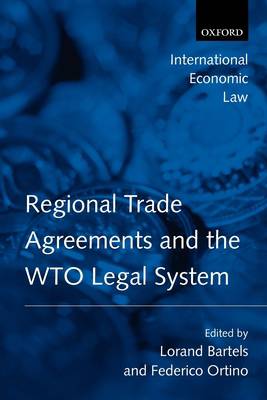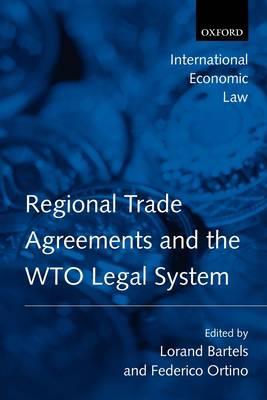
Door een staking bij bpost kan je online bestelling op dit moment iets langer onderweg zijn dan voorzien. Dringend iets nodig? Onze winkels ontvangen jou met open armen!
- Afhalen na 1 uur in een winkel met voorraad
- Gratis thuislevering in België vanaf € 30
- Ruim aanbod met 7 miljoen producten
Door een staking bij bpost kan je online bestelling op dit moment iets langer onderweg zijn dan voorzien. Dringend iets nodig? Onze winkels ontvangen jou met open armen!
- Afhalen na 1 uur in een winkel met voorraad
- Gratis thuislevering in België vanaf € 30
- Ruim aanbod met 7 miljoen producten
Zoeken
Regional Trade Agreements and the WTO Legal System
€ 153,45
+ 306 punten
Omschrijving
The proliferation of regional trade agreements, including both free trade agreements and customs unions, over the past decade has provoked many new legal issues in WTO law, public international law, and an emerging law of regional trade agreements. The various Parts of this book chart this development from a number of perspectives. Part 1 introduces the economic and political underpinnings of regional trade agreements, their constitutional functions, and their role as a locus for integrating trade and human rights. Part 2 examines the WTO rules governing regional trade agreements, focusing on a number of areas in which regional trade agreements prove problematic, such as trade remedies, regulatory standards and rules of origin. Part 3 investigates areas in which regional trade agreements go beyond WTO rules, in areas such as intellectual property, investment, competition, services, sustainable development and mutual recognition, while Part 4 is devoted to the dispute settlement mechanisms of regional trade agreements, and includes illuminating case studies. Part 5 explores the interrelationship between regional trade agreements and the WTO system from the perspective of public international law, involving questions with significance beyond the trade community.
Specificaties
Betrokkenen
- Uitgeverij:
Inhoud
- Aantal bladzijden:
- 640
- Taal:
- Engels
- Reeks:
Eigenschappen
- Productcode (EAN):
- 9780199207008
- Verschijningsdatum:
- 8/02/2007
- Uitvoering:
- Paperback
- Formaat:
- Trade paperback (VS)
- Afmetingen:
- 163 mm x 231 mm
- Gewicht:
- 938 g

Alleen bij Standaard Boekhandel
+ 306 punten op je klantenkaart van Standaard Boekhandel
Beoordelingen
We publiceren alleen reviews die voldoen aan de voorwaarden voor reviews. Bekijk onze voorwaarden voor reviews.










